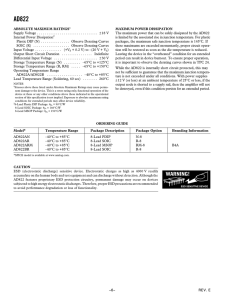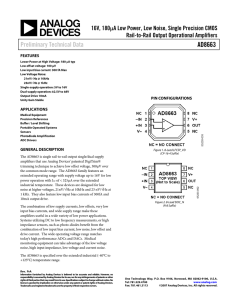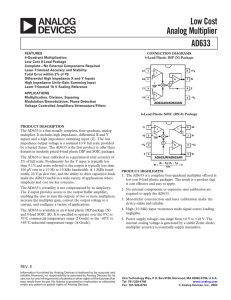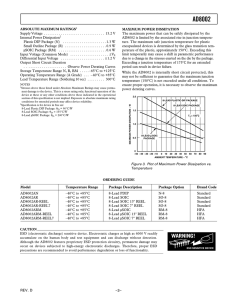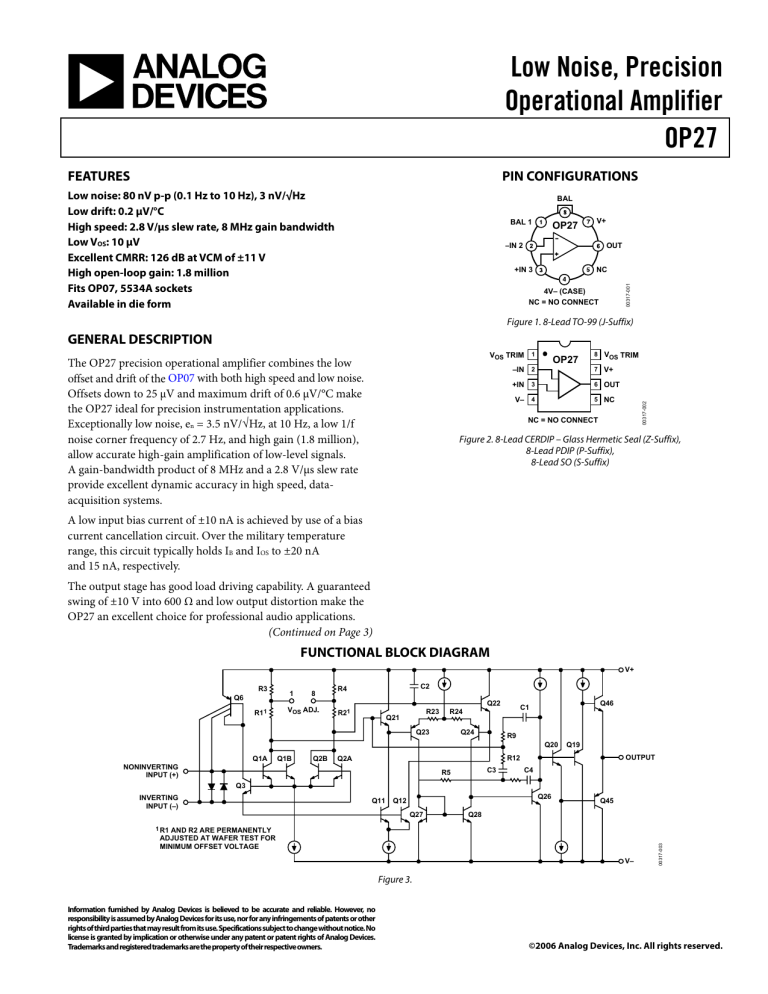
Low Noise, Precision
Operational Amplifier
OP27
PIN CONFIGURATIONS
FEATURES
Low noise: 80 nV p-p (0.1 Hz to 10 Hz), 3 nV/√Hz
Low drift: 0.2 μV/°C
High speed: 2.8 V/μs slew rate, 8 MHz gain bandwidth
Low VOS: 10 μV
Excellent CMRR: 126 dB at VCM of ±11 V
High open-loop gain: 1.8 million
Fits OP07, 5534A sockets
Available in die form
BAL
BAL 1
OP27
V+
OUT
–IN 2
00317-001
NC
+IN 3
4V– (CASE)
NC = NO CONNECT
Figure 1. 8-Lead TO-99 (J-Suffix)
GENERAL DESCRIPTION
VOS TRIM 1
OP27
8
VOS TRIM
–IN 2
7 V+
+IN 3
6 OUT
V– 4
5 NC
00317-002
The OP27 precision operational amplifier combines the low
offset and drift of the OP07 with both high speed and low noise.
Offsets down to 25 μV and maximum drift of 0.6 μV/°C make
the OP27 ideal for precision instrumentation applications.
Exceptionally low noise, en = 3.5 nV/√Hz, at 10 Hz, a low 1/f
noise corner frequency of 2.7 Hz, and high gain (1.8 million),
allow accurate high-gain amplification of low-level signals.
A gain-bandwidth product of 8 MHz and a 2.8 V/μs slew rate
provide excellent dynamic accuracy in high speed, dataacquisition systems.
NC = NO CONNECT
Figure 2. 8-Lead CERDIP – Glass Hermetic Seal (Z-Suffix),
8-Lead PDIP (P-Suffix),
8-Lead SO (S-Suffix)
A low input bias current of ±10 nA is achieved by use of a bias
current cancellation circuit. Over the military temperature
range, this circuit typically holds IB and IOS to ±20 nA
and 15 nA, respectively.
The output stage has good load driving capability. A guaranteed
swing of ±10 V into 600 Ω and low output distortion make the
OP27 an excellent choice for professional audio applications.
(Continued on Page 3)
FUNCTIONAL BLOCK DIAGRAM
V+
R3
Q6
R11
1
8
VOS ADJ..
C2
R4
Q22
R21
R23
Q21
Q24
Q23
Q46
C1
R24
R9
Q20
Q1A
Q1B
Q2B
Q19
OUTPUT
R12
Q2A
NONINVERTING
INPUT (+)
C3
R5
C4
Q3
INVERTING
INPUT (–)
Q11
Q26
Q12
Q27
Q45
Q28
AND R2 ARE PERMANENTLY
ADJUSTED AT WAFER TEST FOR
MINIMUM OFFSET VOLTAGE
V–
00317-003
1 R1
Figure 3.
Information furnished by Analog Devices is believed to be accurate and reliable. However, no
responsibility is assumed by Analog Devices for its use, nor for any infringements of patents or other
rights of third parties that may result from its use. Specifications subject to change without notice. No
license is granted by implication or otherwise under any patent or patent rights of Analog Devices.
Trademarks and registered trademarks are the property of their respective owners.
©2006 Analog Devices, Inc. All rights reserved.
OP27
GENERAL DESCRIPTION
(Continued from Page 1)
PSRR and CMRR exceed 120 dB. These characteristics, coupled
with long-term drift of 0.2 μV/month, allow the circuit designer
to achieve performance levels previously attained only by
discrete designs.
Low cost, high volume production of OP27 is achieved by
using an on-chip Zener zap-trimming network. This reliable
and stable offset trimming scheme has proven its effectiveness
over many years of production history.
The OP27 provides excellent performance in low noise,
high accuracy amplification of low level signals. Applications
include stable integrators, precision summing amplifiers,
precision voltage threshold detectors, comparators, and
professional audio circuits such as tape heads and microphone preamplifiers.
The OP27 is a direct replacement for OP06, OP07, and OP45
amplifiers; AD741 types can be directly replaced by removing
the nulling potentiometer of the AD741.
Rev. F | Page 3 of 20
OP27
SPECIFICATIONS
ELECTRICAL CHARACTERISTICS
VS = ±15 V, TA = 25°C, unless otherwise noted.
Table 1.
Parameter
INPUT OFFSET VOLTAGE 1
LONG-TERM VOS STABILITY 2, 3
INPUT OFFSET CURRENT
INPUT BIAS CURRENT
INPUT NOISE VOLTAGE3, 4
INPUT NOISE
Voltage Density3
Symbol
VOS
VOS/Time
IOS
IB
en p-p
en
INPUT NOISE
Current Density3
in
INPUT RESISTANCE
Differential Mode 5
Common Mode
INPUT VOLTAGE RANGE
COMMON-MODE REJECTION RATIO
POWER SUPPLY REJECTION RATIO
LARGE SIGNAL VOLTAGE GAIN
RIN
RINCM
IVR
CMRR
PSRR
AVO
OUTPUT VOLTAGE SWING
VO
SLEW RATE 6
GAIN BANDWIDTH PRODUCT6
OPEN-LOOP OUTPUT RESISTANCE
POWER CONSUMPTION
OFFSET ADJUSTMENT RANGE
SR
GBW
RO
Pd
Conditions
Min
0.1 Hz to 10 Hz
fO = 10 Hz
fO = 30 Hz
fO = 1000 Hz
fO = 10 Hz
fO = 30 Hz
fO = 1000 Hz
1.3
VCM = ±11 V
VS = ±4 V to ±18 V
RL ≥ 2 k Ω, VO = ±10 V
RL ≥ 600 Ω, VO = ±10 V
RL ≥ 2 k Ω
RL ≥ 600 Ω
RL ≥ 2 kΩ
VO = 0, IO = 0
VO
RP = 10 kΩ
1
±11.0
114
1000
800
±12.0
±10.0
1.7
5.0
OP27A/E
Typ
10
0.2
7
±10
0.08
3.5
3.1
3.0
1.7
1.0
0.4
6
3
±12.3
126
1
1800
1500
±13.8
±11.5
2.8
8.0
70
90
±4.0
Max
25
1.0
35
±40
0.18
5.5
4.5
3.8
4.0
2.3
0.6
Min
0.7
±11.0
100
10
700
600
±11.5
±10.0
1.7
5.0
140
OP27/G
Typ
30
0.4
12
±15
0.09
3.8
3.3
3.2
1.7
1.0
0.4
4
2
±12.3
120
2
1500
1500
±13.5
±11.5
2.8
8.0
70
100
±4.0
Max
100
2.0
75
±80
0.25
8.0
5.6
4.5
0.6
20
170
Unit
μV
μV/MO
nA
nA
μV p-p
nV/√Hz
nV/√Hz
nV/√Hz
pA/√Hz
pA/√Hz
pA/√Hz
MΩ
GΩ
V
dB
μV/V
V/mV
V/mV
V
V
V/μs
MHz
Ω
mW
mV
Input offset voltage measurements are performed approximately 0.5 seconds after application of power. A/E grades guaranteed fully warmed up.
Long-term input offset voltage stability refers to the average trend line of VOS vs. time over extended periods after the first 30 days of operation. Excluding the initial
hour of operation, changes in VOS during the first 30 days are typically 2.5 μV. Refer to the Typical Performance Characteristics section.
3
Sample tested.
4
See voltage noise test circuit (Figure 31).
5
Guaranteed by input bias current.
6
Guaranteed by design.
2
Rev. F | Page 4 of 20
OP27
VS = ±15 V, −55°C ≤ TA ≤ 125°C, unless otherwise noted.
Table 2.
Parameter
INPUT OFFSET VOLTAGE 1
AVERAGE INPUT OFFSET DRIFT
Symbol
VOS
TCVOS 2
TCVOSn 3
IOS
IB
IVR
CMRR
PSRR
AVO
VO
INPUT OFFSET CURRENT
INPUT BIAS CURRENT
INPUT VOLTAGE RANGE
COMMON-MODE REJECTION RATIO
POWER SUPPLY REJECTION RATIO
LARGE SIGNAL VOLTAGE GAIN
OUTPUT VOLTAGE SWING
Conditions
VCM = ±10 V
VS = ±4.5 V to ±18 V
RL ≥ 2 kΩ, VO = ±10 V
RL ≥ 2 kΩ
Min
OP27A
Typ
30
±10.3
108
0.2
15
±20
±11.5
122
2
1200
±13.5
600
±11.5
Max
60
Unit
μV
0.6
50
±60
μV/°C
nA
nA
V
dB
μV/V
V/mV
V
16
1
Input offset voltage measurements are performed by automated test equipment approximately 0.5 seconds after application of power. A/E grades guaranteed fully
warmed up.
2
The TCVOS performance is within the specifications unnulled or when nulled with RP = 8 kΩ to 20 kΩ. TCVOS is 100% tested for A/E grades, sample tested for G grades.
3
Guaranteed by design.
VS = ±15 V, −25°C ≤ TA ≤ 85°C for OP27J, OP27Z, 0°C ≤ TA ≤ 70°C for OP27EP, and –40°C ≤ TA ≤ 85°C for OP27GP, OP27GS, unless
otherwise noted.
Table 3.
Parameter
INPUT ONSET VOLTAGE
AVERAGE INPUT OFFSET DRIFT
INPUT OFFSET CURRENT
INPUT BIAS CURRENT
INPUT VOLTAGE RANGE
COMMON-MODE REJECTION RATIO
POWER SUPPLY REJECTION RATIO
LARGE SIGNAL VOLTAGE GAIN
OUTPUT VOLTAGE SWING
1
2
Symbol
VOS
TCVOS 1
TCVOSn 2
IOS
IB
IVR
CMRR
PSRR
AVO
VO
Conditions
VCM = ±10 V
VS = ±4.5 V to ±18 V
RL ≥ 2 kΩ, VO = ±10 V
RL ≥ 2 kΩ
Min
±10.5
110
750
±11.7
OP27E
Typ
20
0.2
0.2
10
±14
±11.8
124
2
1500
±13.6
Max
50
0.6
0.6
50
±60
Min
±10.5
96
15
450
±11.0
OP27G
Typ
55
04
04
20
±25
±11.8
118
2
1000
±13.3
Max
220
1.8
1.8
135
±150
32
Unit
μV
μV/°C
μV/°C
nA
nA
V
dB
μV/V
V/mV
V
The TCVOS performance is within the specifications unnulled or when nulled with RP = 8 kΩ to 20 kΩ. TCVOS is 100% tested for A/E grades, sample tested for C/G grades.
Guaranteed by design.
Rev. F | Page 5 of 20
OP27
TYPICAL ELECTRICAL CHARACTERISTICS
VS = ±15 V, TA = 25°C unless otherwise noted.
Table 4.
Parameter
AVERAGE INPUT OFFSET VOLTAGE DRIFT 1
AVERAGE INPUT OFFSET CURRENT DRIFT
AVERAGE INPUT BIAS CURRENT DRIFT
INPUT NOISE VOLTAGE DENSITY
INPUT NOISE CURRENT DENSITY
INPUT NOISE VOLTAGE SLEW RATE
GAIN BANDWIDTH PRODUCT
1
Symbol
TCVOS or
TCVOSn
TCIOS
TCIB
en
en
en
Conditions
Nulled or unnulled
RP = 8 kΩ to 20 kΩ
in
in
in
enp-p
SR
GBW
fO = 10 Hz
fO = 30 Hz
fO = 1000 Hz
0.1 Hz to 10 Hz
RL ≥ 2 kΩ
fO = 10 Hz
fO = 30 Hz
fO = 1000 Hz
OP27N Typical
0.2
Unit
μV/°C
80
100
3.5
3.1
3.0
pA/°C
pA/°C
nV/√Hz
nV/√Hz
nV/√Hz
1.7
1.0
0.4
0.08
2.8
8
pA/√Hz
pA/√Hz
pA/√Hz
μV p-p
V/μs
MHz
Input offset voltage measurements are performed by automated test equipment approximately 0.5 seconds after application of power.
Rev. F | Page 6 of 20
OP27
ABSOLUTE MAXIMUM RATINGS
Table 5.
Parameter
Supply Voltage
Input Voltage 1
Output Short-Circuit Duration
Differential Input Voltage 2
Differential Input Current2
Storage Temperature Range
Operating Temperature Range
OP27A (J, Z)
OP27E, ( Z)
OP27E, (P)
OP27G (P, S, J, Z)
Lead Temperature Range (Soldering, 60 sec)
Junction Temperature
Rating
±22 V
±22 V
Indefinite
±0.7 V
±25 mA
−65°C to +150°C
Stresses above those listed under Absolute Maximum Ratings
may cause permanent damage to the device. This is a stress
rating only; functional operation of the device at these or any
other conditions above those indicated in the operational
section of this specification is not implied. Exposure to absolute
maximum rating conditions for extended periods may affect
device reliability.
THERMAL RESISTANCE
−55°C to +125°C
−25°C to +85°C
0°C to 70°C
−40°C to +85°C
300°C
−65°C to +150°C
θJA is specified for the worst-case conditions, that is, θJA is
specified for device in socket for TO, CERDIP, and PDIP
packages; θJA is specified for device soldered to printed circuit
board for SO package.
Absolute maximum ratings apply to both DICE and packaged
parts, unless otherwise noted.
1
For supply voltages less than ±22 V, the absolute maximum input voltage is
equal to the supply voltage.
2
The inputs of the OP27 are protected by back-to-back diodes. Current
limiting resistors are not used in order to achieve low noise. If differential
input voltage exceeds ±0.7 V, the input current should be limited to 25 mA.
Table 6.
Package Type
TO-99 (J)
8-Lead Hermetic DlP (Z)
8-Lead Plastic DIP (P)
8-Lead SO (S)
θJA
150
148
103
158
ESD CAUTION
ESD (electrostatic discharge) sensitive device. Electrostatic charges as high as 4000 V readily accumulate on
the human body and test equipment and can discharge without detection. Although this product features
proprietary ESD protection circuitry, permanent damage may occur on devices subjected to high energy
electrostatic discharges. Therefore, proper ESD precautions are recommended to avoid performance
degradation or loss of functionality.
Rev. F | Page 7 of 20
θJC
18
16
43
43
Unit
°C/W
°C/W
°C/W
°C/W
OP27
OUTLINE DIMENSIONS
0.400 (10.16)
0.365 (9.27)
0.355 (9.02)
8
5
1
4
0.280 (7.11)
0.250 (6.35)
0.240 (6.10)
0.100 (2.54)
BSC
0.060 (1.52)
MAX
0.210
(5.33)
MAX
0.150 (3.81)
0.130 (3.30)
0.115 (2.92)
0.195 (4.95)
0.130 (3.30)
0.115 (2.92)
0.015
(0.38)
MIN
0.015 (0.38)
GAUGE
PLANE
SEATING
PLANE
0.022 (0.56)
0.018 (0.46)
0.014 (0.36)
5.00 (0.1968)
4.80 (0.1890)
0.325 (8.26)
0.310 (7.87)
0.300 (7.62)
PIN 1
0.430 (10.92)
MAX
0.005 (0.13)
MIN
8
4.00 (0.1574)
3.80 (0.1497) 1
0.014 (0.36)
0.010 (0.25)
0.008 (0.20)
5
4
1.27 (0.0500)
BSC
0.25 (0.0098)
0.10 (0.0040)
6.20 (0.2440)
5.80 (0.2284)
8°
0.25 (0.0098) 0° 1.27 (0.0500)
0.40 (0.0157)
0.17 (0.0067)
0.51 (0.0201)
COPLANARITY
SEATING 0.31 (0.0122)
0.10
PLANE
0.070 (1.78)
0.060 (1.52)
0.045 (1.14)
0.50 (0.0196)
× 45°
0.25 (0.0099)
1.75 (0.0688)
1.35 (0.0532)
COMPLIANT TO JEDEC STANDARDS MS-001-BA
CONTROLLING DIMENSIONS ARE IN INCHES; MILLIMETER DIMENSIONS
(IN PARENTHESES) ARE ROUNDED-OFF INCH EQUIVALENTS FOR
REFERENCE ONLY AND ARE NOT APPROPRIATE FOR USE IN DESIGN.
CORNER LEADS MAY BE CONFIGURED AS WHOLE OR HALF LEADS.
COMPLIANT TO JEDEC STANDARDS MS-012-AA
CONTROLLING DIMENSIONS ARE IN MILLIMETERS; INCH DIMENSIONS
(IN PARENTHESES) ARE ROUNDED-OFF MILLIMETER EQUIVALENTS FOR
REFERENCE ONLY AND ARE NOT APPROPRIATE FOR USE IN DESIGN.
Figure 46. 8-Lead Plastic Dual-in-Line Package [PDIP]
(N-8)
P-Suffix
Dimensions shown in inches and (millimeters)
Figure 48. 8-Lead Standard Small Outline Package [SOIC]
Narrow Body
(R-8)
S-Suffix
Dimensions shown in millimeters and (inches)
0.005 (0.13)
MIN
5
REFERENCE PLANE
0.310 (7.87)
0.220 (5.59)
1
4
0.1850 (4.70)
0.1650 (4.19)
0.0500 (1.27) MAX
0.100 (2.54) BSC
0.150 (3.81)
MIN
0.200 (5.08)
0.125 (3.18)
0.023 (0.58)
0.014 (0.36)
0.070 (1.78)
0.030 (0.76)
SEATING
PLANE
15°
0°
0.015 (0.38)
0.008 (0.20)
0.3700 (9.40)
0.3350 (8.51)
0.060 (1.52)
0.015 (0.38)
0.1000 (2.54)
BSC
0.1600 (4.06)
0.1400 (3.56)
5
0.3350 (8.51)
0.3050 (7.75)
0.320 (8.13)
0.290 (7.37)
0.405 (10.29) MAX
0.200 (5.08)
MAX
0.5000 (12.70)
MIN
0.2500 (6.35) MIN
0.2000
(5.08)
BSC
0.0400 (1.02) MAX
0.0400 (1.02)
0.0100 (0.25)
0.0190 (0.48)
0.0160 (0.41)
0.1000
(2.54)
BSC
0.0210 (0.53)
0.0160 (0.41)
4
6
2
8
3
7
1
0.0450 (1.14)
0.0270 (0.69)
0.0340 (0.86)
0.0280 (0.71)
45° BSC
BASE & SEATING PLANE
COMPLIANT TO JEDEC STANDARDS MO-002-AK
CONTROLLING DIMENSIONS ARE IN INCHES; MILLIMETER DIMENSIONS
(IN PARENTHESES) ARE ROUNDED-OFF INCH EQUIVALENTS FOR
REFERENCE ONLY AND ARE NOT APPROPRIATE FOR USE IN DESIGN.
CONTROLLING DIMENSIONS ARE IN INCHES; MILLIMETER DIMENSIONS
(IN PARENTHESES) ARE ROUNDED-OFF INCH EQUIVALENTS FOR
REFERENCE ONLY AND ARE NOT APPROPRIATE FOR USE IN DESIGN.
Figure 47. 8-Lead Ceramic DIP – Glass Hermetic Seal [CERDIP]
(Q-8)
Z-Suffix
Dimensions shown in inches and (millimeters)
Figure 49. 8-Lead Metal Can [TO-99]
(H-08)
J-Suffix
Dimensions shown in inches and (millimeters)
Rev. F | Page 19 of 20
022306-A
8
0.055 (1.40)
MAX
OP27
ORDERING GUIDE
Model
OP27AJ/883C
OP27GJ
OP27AZ
OP27AZ/883C
OP27EZ
OP27GZ
OP27EP
OP27EPZ 1
OP27GP
OP27GPZ1
OP27GS
OP27GS-REEL
OP27GS-REEL7
OP27GSZ1
OP27GSZ-REEL1
OP27GSZ-REEL71
OP27NBC
1
Temperature Range
–55° to +125°C
–40° to +85°C
–55° to +125°C
–55° to +125°C
–25° to +85°C
–40° to +85°C
0° to +70°C
0° to +70°C
–40° to +85°C
–40° to +85°C
–40° to +85°C
–40° to +85°C
–40° to +85°C
–40° to +85°C
–40° to +85°C
–40° to +85°C
Package Description
8-Lead Metal Can (TO-99)
8-Lead Metal Can (TO-99)
8-Lead CERDIP
8-Lead CERDIP
8-Lead CERDIP
8-Lead CERDIP
8-Lead PDIP
8-Lead PDIP
8-Lead PDIP
8-Lead PDIP
8-Lead SOIC
8-Lead SOIC
8-Lead SOIC
8-Lead SOIC
8-Lead SOIC
8-Lead SOIC
Die
Z = Pb-free part.
Rev. F | Page 20 of 20
Package Option
J-Suffix (H-08)
J-Suffix (H-08)
Z-Suffix (Q-8)
Z-Suffix (Q-8)
Z-Suffix (Q-8)
Z-Suffix (Q-8)
P-Suffix (N-8)
P-Suffix (N-8)
P-Suffix (N-8)
P-Suffix (N-8)
S-Suffix (R-8)
S-Suffix (R-8)
S-Suffix (R-8)
S-Suffix (R-8)
S-Suffix (R-8)
S-Suffix (R-8)

